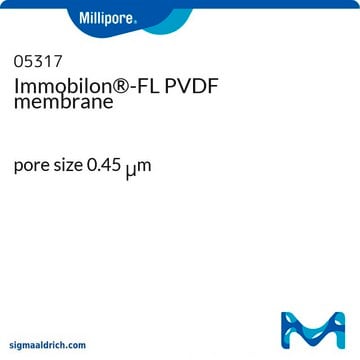IPFL20200
Immobilon® -FL PVDF Membrane
10 sheets, 20cm x 20 cm, 0.45 µm pore size, transfer membrane with low background fluorescence
Synonym(s):
Western blotting membrane, blotting membrane, transfer membrane
About This Item
Recommended Products
product name
Immobilon®-FL PVDF Membrane, 10 sheets, 20 cm x 20 cm, 0.45 µm pore size, Hydrophobic PVDF Transfer Membrane with low background fluorescence for Western blotting. Compatible with visible and infrared fluorescent probes.
material
PVDF membrane
plain filter
white filter
Quality Level
feature
hydrophobic
manufacturer/tradename
Immobilon®
technique(s)
dot blot: suitable
western blot: suitable
filter L × W
20 cm × 20 cm
pore size
0.45 μm pore size
capacity
155 μg/cm2 adsorption capacity (insulin)
205 μg/cm2 adsorption capacity (BSA)
300 μg/cm2 adsorption capacity (goat IgG)
compatibility
for use with Amido black
for use with CPTS
for use with Coomassie brilliant blue
for use with Ponceau-S red
detection method
chemiluminescent
colorimetric
fluorometric
shipped in
ambient
General description
Application
Features and Benefits
- Designed for optimal fluorescent immunodetection
- Extremely low background improves the sensitivity of all fluorescence detection protocols
- suitable for all commonly used fluorescent probes at all excitation and emission wavelengths
- compatible with standard blocking agents and buffers
- Ideal for multiplexing and chemifluorescence detection
Legal Information
Storage Class Code
11 - Combustible Solids
WGK
WGK 3
Flash Point(F)
Not applicable
Flash Point(C)
Not applicable
Certificates of Analysis (COA)
Search for Certificates of Analysis (COA) by entering the products Lot/Batch Number. Lot and Batch Numbers can be found on a product’s label following the words ‘Lot’ or ‘Batch’.
Already Own This Product?
Find documentation for the products that you have recently purchased in the Document Library.
Our team of scientists has experience in all areas of research including Life Science, Material Science, Chemical Synthesis, Chromatography, Analytical and many others.
Contact Technical Service





